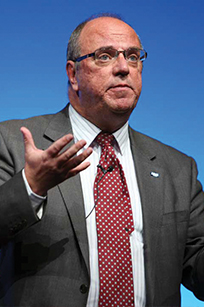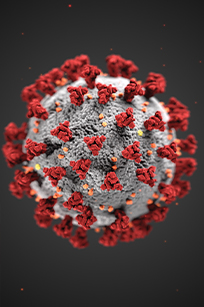Covid-19: supporting the front line
 The coronavirus, Covid-19, has changed the world. The NHS is now largely geared to addressing this threat, changing the way care is delivered, how money flows through the system and how finance supports the care of patients. It’s a fast-moving environment that saw a Budget, which set aside an initial £5bn for the NHS and other public services to respond to the coronavirus, overtaken by events.
The coronavirus, Covid-19, has changed the world. The NHS is now largely geared to addressing this threat, changing the way care is delivered, how money flows through the system and how finance supports the care of patients. It’s a fast-moving environment that saw a Budget, which set aside an initial £5bn for the NHS and other public services to respond to the coronavirus, overtaken by events.
NHS England and NHS Improvement have been quick to act – not only taking much-needed practical action to free up beds and increase the capacity to deliver oxygen to the bedside, but also in making wide-ranging changes to financial guidance that supports the NHS response to the virus.
The key message is that finance should not be a barrier to the care of patients with Covid-19. The finance regime has been simplified and greater certainty on the flow of money has been given to reduce the burden on trusts and help NHS organisations support the wider economy by paying suppliers promptly.
The operational planning guidance due to be implemented this month – which sought to speed up the pace of integration and reduce deficits – has been put on the back burner, with the Financial Recovery Fund and associated rules on eligibility suspended.
The Covid-19 guidance frees up managerial capacity. In the short term at least, leaders will not have to worry about implementing the NHS people plan, new standards for access to care or the NHS long-term plan implementation framework. All of these were due to be published in the coming weeks, but have now been deferred until later this year. The latter will not now be available until the autumn and it is recommended that local plans also be deferred until then.
The finance changes are temporary – initially applying from 1 April to 31 July. Over this four-month period, providers will receive a guaranteed minimum income, reflecting current costs. With the usual national tariff payment mechanism suspended during the period, trusts and commissioners should agree block contracts to provide this minimum monthly payment.
Provider costs
NHS England and NHS Improvement are to ensure all costs are covered while maintaining robust financial governance. Payments will be made ‘on account’, with top-ups available for any additional coronavirus-related work that has to be done.
The figures for the payment to be made from each clinical commissioning group to their providers have been calculated nationally, based on the average monthly expenditure implied by the month 9 agreement of balances exercise. This figure has been uplifted to account for inflation (pay rises and the clinical negligence scheme for trusts, CNST) and no efficiency factor has been applied. Clinical quality CQUIN payments are included, assuming 100% delivery.
Mental health trust uplifts will include an additional sum consistent with the amount needed to deliver the mental health investment standard.
The block contract for a provider’s co-ordinating commissioner also includes a sum for non-contracted activity equivalent to the historical monthly average for this work. Trusts have been told to stop invoicing for this activity for the four months, but to continue recording non-contracted activity in SUS as normal.
As well as the minimum income that will flow through block contracts, providers will be able to claim monthly top-ups, depending on the additional cost of Covid-19 treatment. The guidance says these must reflect ‘genuine and reasonable additional marginal costs due to Covid-19’. These costs could include:
- Evidenced increases in staffing costs, compared with the baseline period, that are associated with dealing with the increased total activity
- Increases in temporary staffing to cover higher levels of sickness absence or to deal with other caring responsibilities (such as looking after family members)
- Payments to bank or sub-contractor staff to ensure all sickness absence is covered.
- Additional costs of dealing with Covid-19 activity – for example, the costs of running NHS 111 assessment pods; increases in the volumes required or prices of equipment to deal with the response to the virus (where not offset by reductions elsewhere); extra costs of decontamination and transport for the ambulance service; higher testing volumes in acute-based laboratories; and community-based swabbing services.
The top-up claims should be made alongside regular monthly financial reports. NHS England and NHS Improvement believe the funding providers receive through the block contracts plus the top-ups should be enough to deliver a breakeven position in the four-month period. They add that this will be the basis for the monitoring of financial performance.
The first block contract payments from commissioners will be made on 1 April and 15 April, covering both April and May funding. Further payments will be made on 15 May and 15 June. The payment on 1 April will be for the amount already agreed between commissioners and providers. This means that by 15 April, providers will have two months’ cash, allowing them to ramp up prompt payment of suppliers.
The guidance adds that prompt payments are vital to ensure that cashflow for NHS and non-NHS providers of goods and services does not become a barrier to the provision of services. The steps described in the guidance should mean that providers’ requirement for interim working capital is minimal, though those that do need additional support should apply in the usual way.
Payments made by commissioners under block contracts should not be revised if there are shortfalls in normal contractual performance. NHS England and NHS Improvement note that most NHS providers are exempt from the majority of contract sanctions – but until further notice any remaining sanctions for all NHS providers are suspended.
Most of the guidance focuses on the first few months of the 2020/21 financial year, but it does recognise Covid-19 costs will have been incurred during 2019/20.
For acute and ambulance providers, there will be an initial payment on account for these costs, based on submissions received to date. Commissioners and acute, community and ambulance providers will receive a final payment based on the updated cost template.
Allocations
Commissioner allocations for 2020/21 will not be changed. However, NHS England and NHS Improvement say they will take into account a number of factors when assessing commissioner financial positions and affordability, such as the impact of block contracting. This includes the cost of removing the tariff efficiency factor and the benefit of excluding activity growth from block funding payments.
Commissioners and local authorities are being urged to pool budgets for community-based services – through the Better Care Fund or section 75 agreements. NHS England and NHS Improvement believe this will avoid the distraction of debates over which organisation is liable for the cost of a service.
The expected reductions in service development investment will also be considered when looking at commissioner finances. This will include the impact of funding transferred between commissioners to pay for the non-contracted element of the block contract, and the cost of additional service commitments, such as extra out-of-hours provision.
Transformation initiatives will be reviewed and, if deemed unable to proceed during the coronavirus emergency, the funding will be redistributed.
NHS England and NHS Improvement are also aware that some commissioners need additional funding to meet their expenditure. These organisations will be given a top-up payment, calculated broadly on the same basis as the FRF, to cover the shortfall.
Governance
While NHS England and NHS Improvement are keen to remove any barriers to treating patients with Covid-19, they also want to make sure organisations retain strong governance. The guidance stresses the need to maintain financial control and proper stewardship of public funds during the coming months.
As a matter of urgency, organisations should review their financial governance to ensure decisions to commit resources to tackling Covid-19 are robust. Staff absences could be significant and the resilience of finance and business functions – especially payroll, accounts payable and core reporting – should be tested, as should the strength of antifraud arrangements. Reasonable costs will be reimbursed, but this was not a signal that financial control was unnecessary during this period. Costs must be recorded as the NHS will have to account for its spending to the National Audit Office and Parliament, once the outbreak is over.
Normal financial arrangements are suspended, so no new revenue business investments should be entered into, unless related to Covid-19 or if NHS England and NHS Improvement agree it is consistent with a previously agreed plan. Providers should agree an approach with the national bodies if costs have already been committed or a body has entered into a contract.
Indicative capital allocations for 2020/21 were due to be released shortly as Healthcare Finance went to press and the guidance acknowledges the importance of capital in the Covid-19 response. It will be required to modify theatres, for example, to extend the supply and delivery of oxygen, and to purchase ventilators.
While NHS England and NHS Improvement may bulk purchase some supplies, this will not always be practical or desirable.
Providers and commissioners can access capital needed for their Covid-19 response if the planned spending is clearly linked to Covid-19 care, and if the asset can be delivered or building work completed within the expected duration of the outbreak.
The guidance anticipates that most of the capital needed will be within the delegated limits for commissioners (£10m) and providers (£15m). Public dividend capital dividends will not be chargeable on capital funding related to Covid-19.
The NHS has taken swift action to ensure finance does not prevent services from treating patients with Covid-19, largely sweeping away a financial architecture that has built up over many years.
For now, the finance function focus has to be on helping clinicians get the best services to patients, but it must also cling to the ideal of strong governance and accountability.
- For all HFMA materials relating to the Covid-19 pandemic, including a summary of the financial changes and financial governance considerations, click here
Finance function
The simplified temporary finance regime will have an obvious effect on the finance function. It shifts the emphasis on to simplicity and certainty with a focus on keeping the cash flowing and the key functions of paying staff and suppliers operating smoothly.
Finance staff have a major role in identifying additional costs incurred in organisations’ response to the virus and will also have to maintain financial control while ensuring that purchases are made in a timely way to support services. The annual accounts also have to
be completed, albeit to a revised timetable.
The centre recognises that while some teams are well placed to deliver the accounts, others will need the extra time. And as the virus continues to spread, finance departments are likely to have their own staffing problems due to illness, self-isolation or because staff are needed elsewhere to support other critical functions.
A number of burdens have already been lifted – and further requirements or deadlines could yet be relaxed.
The postponement of the implementation of the IFRS 16 leasing standard until April 2021/22 was one change that was widely welcomed.
Some finance directors said their staff were working well from home, with good access to finance systems, others said their access to technology was limited. Many finance staff have already been reallocated to different roles – one costing practitioner said he was supporting payment activities.
As Healthcare Finance went to press, an announcement was still awaited on the 2019/20 national cost collection and clarity was also being sought on the next steps in the Costing Transformation Programme.
NHS Shared Business Services, which provides finance and accounting, payroll and procurement services across the NHS said it was focused on ensuring cash was flowing around the system. With 15,000 invoices a day still paper-based, it said it was encouraging suppliers wherever possible to submit invoices electronically.
And with more than 65,000 retired doctors and nurses being asked to return to the NHS, SBS finance and accounting director Stephen Sutcliffe said getting all these new starters onto the system promptly would be a key challenge.
Staff remain a key issue. The Covid-19 crisis is taking place against a background of the NHS already facing high vacancies. And as demand increases, finance directors expected agency and locum costs to rise and were concerned that neighbouring NHS organisations could be left competing for staff and supplies.
 On Twitter, former NHS chief executive David Nicholson praised the efforts of ‘wonderful people’ in the NHS, but he was concerned that some agency locum junior doctors were costing £100 an hour.
On Twitter, former NHS chief executive David Nicholson praised the efforts of ‘wonderful people’ in the NHS, but he was concerned that some agency locum junior doctors were costing £100 an hour.
The Department of Health and Social Care has sought to address these concerns, writing to staffing agencies with an appeal for them to work with NHS and social care providers to ensure agency staff are ‘proportionately remunerated’, placed efficiently, fully compliant with registration rules and aware of coronavirus guidance.
Covid-19: other measures
The centre’s response to Covid-19 has been wide-ranging:
- Freeing up the maximum possible inpatient and critical care capacity – 30,000 or more of the 100,000 general acute beds by postponing all non-urgent elective operations from 15 April for at least three months (earlier if necessary); discharging all inpatients medically fit to leave
- The Care Quality Commission announced it had stopped routine inspections,
 though it made clear that it could still use its powers in a limited number of cases where harm is evident
though it made clear that it could still use its powers in a limited number of cases where harm is evident - To tackle shortages of PPE (personal protective equipment – such as masks and gowns), the Department of Health and Social Care ramped up deliveries to trusts, enlisting the army to help with deliveries
- The government passed the Coronavirus Act – temporary, emergency legislation that includes additional clinical negligence indemnity, allows the speedy registration of healthcare professionals and the suspension of pension rules that would block retired NHS Pension Scheme members from returning to work. There is a potential pool of 15,500 doctors and 50,000 nurses, midwives and nursing associates who have left the registers over the last three years
- A new sick note that can be obtained online, to reduce the pressure on GPs
- Measures to protect GP income, with practices paid on the assumption that they are performing at historical levels
- A deal was struck with independent hospital providers, buying up 8,000 beds across England, almost 1,200 more ventilators, more than 10,000 nurses, over 700 doctors and more than 8,000 other clinical staff.
- A temporary coronavirus hospital, which could hold up to 4,000 beds, at London’s ExCel exhibition centre has been arranged. Media reports suggested further facilities in Birmingham, Manchester and Glasgow were also being considered.
Related content
We are excited to bring you a fun packed Eastern Branch Conference in 2025 over three days.
This event is for those that will benefit from an overview of costing in the NHS or those new to costing and will cover why we cost and the processes.